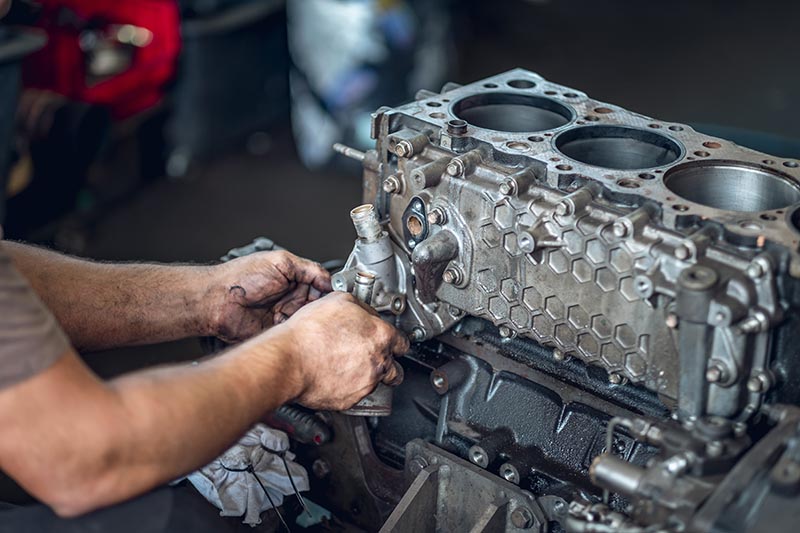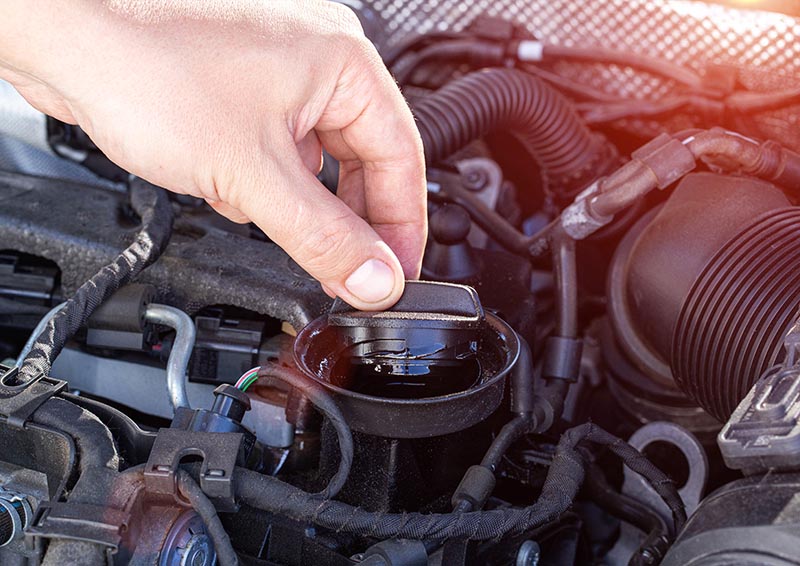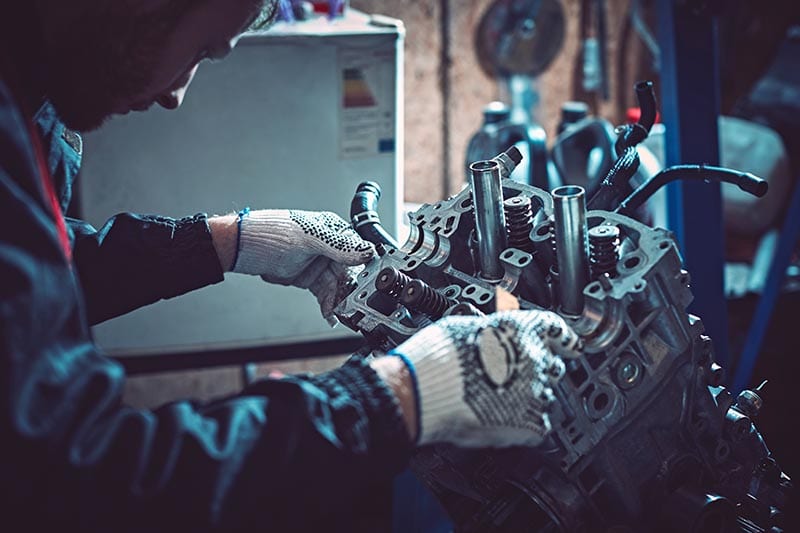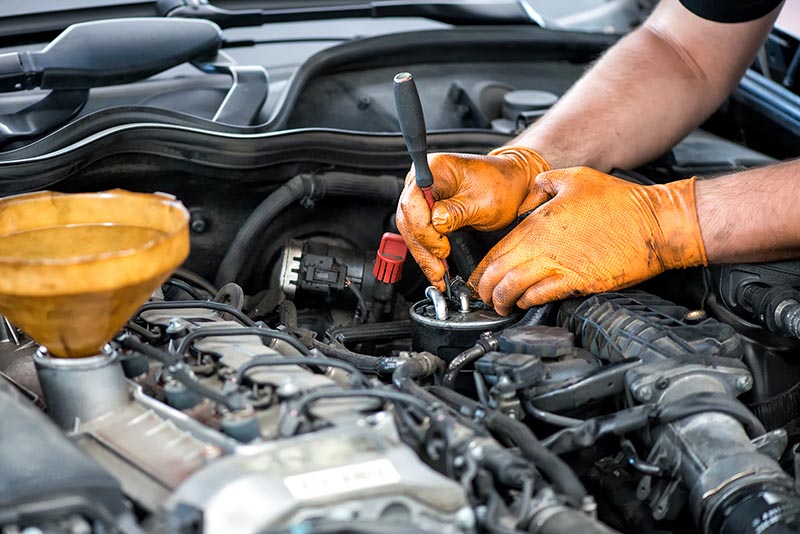What Is Blow-By in a Diesel Engine? Causes, Symptoms & FAQ
-
Pete Ortiz
- Last updated:

Blow-by is a process that can occur in any diesel engine. Anyone that is considering getting a diesel engine, whether for work, in their truck, or for a generator, will have heard about blow-by during their research. But what exactly is blow-by? What causes it? Is it dangerous for you or the engine? This overview will get to the heart of what blow-by is and if it is something you should be concerned about.
Engine Blow-By Overview
Engine blow-by happens when combustion gasses escape the combustion chamber in a way that it is not supposed to. When they are running, diesel engines undergo a continuous process of combustion. This combustion takes diesel fuel, air, and a spark and transforms it into energy that is used to move the pistons in the engine. In a perfect world, this combustion would be completely contained and result in a perfect reaction. But our technology is not good enough to get that ideal result. Instead, engines lose energy to heat and produce large amounts of unusable exhaust byproducts. This can result in leaks that result in a blow-by.
Whenever heat or gas escapes from the combustion chamber in a way that it shouldn’t, it causes blow-by.

What Causes Engine Blow-By?
The main culprit of engine blow-by is gaps around the piston rings. This is the area most likely to allow an escape route for the combustion. Blow-by occurs whenever fuel, fuel-air mixtures, or combustion gasses get out of the chamber and into the engine’s crankcase.
If there are any leaks, cracks, or misfitting elements of the seals and rings around the pistons, it could result in some blow-by. Broken pistons, blown piston rings, or improperly installed or repaired pistons or piston rings can all result in blow-by. Anything that allows combustion gasses or fuel mixtures to escape the combustion chamber into the crankcase will result in a blow-by.
Gaps and cracks are the main sources of blow-by because that is how the gas escapes the combustion chamber.
What Are the Symptoms of Blow-By?
Blow-by can often be diagnosed by looking for the symptoms. The symptoms of blow-by are often generic and easy to miss. Looking for multiple symptoms is the best way to determine if your engine is experiencing excessive blow-by or another issue. These are some of the most common symptoms of blow-by to look out for.
Bad Noises
Loud roaring or sputtering noises often accompany blow-by. As the gas escapes the combustion chamber, it alters the combustion of the engine. Too much and the engine will not undergo proper combustion leading to loud noises. The sputtering occurs when the gas escapes in bursts. If you experience loud sputtering or roaring when your diesel engine is running, blow-by could be the issue.
Rough Idling
Rough idle is a common symptom of a lot of engine issues. It can also be a symptom of blow-by. Look for rough idling alongside any of these other symptoms as a potential sign of excessive diesel blow-by.
Misfiring
Similar to rough idling, misfiring is another symptom that could appear with any number of issues in the engine. If you start misfiring more frequently and suspect you could have a blow-by issue, these problems could definitely be linked.
Soot Build Up
Blow-by decreases combustion efficiency and can even lead to incomplete combustion processes. Inefficient or incomplete combustion leaves behind a lot more soot than an efficient combustion process. If you notice large amounts of soot building up in the engine, especially in and around the cylinder walls, it could be indicative of a blow-by issue.
Random Exhaust Clouds
If your engine suddenly revs up or produces large amounts of exhaust seemingly at random, it could be a sign of blow-by. Look for strange exhaust emissions, especially when the clouds are getting larger for no reason, in connection to this problem.
White Smoke
One of the most conclusive signs of excessive diesel blow-by is a white smoke that will appear in the engine. The smoke will often come up and out of the oil fill tube or be seen around the valve cover. This smoke is the result of the escaping gasses and improper burning that is taking place as a result of the blow-by.
Is Diesel Engine Blow-By Normal?
Yes. Blow-by in a diesel engine is normal in small and infrequent doses. Engines are not hermetically or vacuum sealed. There are openings and gaps that naturally occur within the engine. This is normal. These gaps can widen as engines age. Wear and tear on the parts of the engine, including the crankcase, pistons, cylinders, seals, valves, and rings, can all create small gaps that gas escapes through, creating blow-by.
A typical diesel engine in good condition could experience as much as one cubic foot per minute of blow-by. This is normal. Blow-by only becomes a problem when it becomes excessive. Excessive blow-by can be an indication of a much larger problem brewing in the engine that needs to be addressed.

Frequently Asked Questions (FAQ)
How Do You Fix Blow-By In a Diesel Engine?
If the blow-by in your engine is mild, the easiest fix is to clean the piston rings and check them for signs of wear or damage. Getting brand new piston rings can also help the problem. If the gaps in the piston rings are not to blame, the problem could be gaps, cracks, or wear deeper in the engine, which could result in more extensive repairs.
In order to look into getting blow-by fixed, you often need to bring your vehicle to a specialized diesel mechanic. Some people are comfortable cleaning and examining their own piston rings but if that is not you, take it to a mechanic. Blow-by is a problem that grows larger over time so getting the engine checked out when the problem is still early is key to preventing larger issues from developing. Blow-by is a common issue, and diesel mechanics will be able to quickly diagnose and repair the problems causing blow-by.
The best way to prevent excessive engine blow-by is to get regular maintenance done on your vehicle. Get your oil changed, use high-quality fluids, and have the valves and rings checked annually. Do not ignore small problems. All of these things will help keep your engine tightened up and tuned up, which is the best way to prevent these gaps from forming in the engine that causes blow-by.
Can Blow-By Hurt Your Engine?
Regular blow-by does not hurt the engine. Excessive blow-by can hurt an engine. An engine experiencing frequent or excessive blow-by will suffer from reduced efficiency, reduced power, and reduced gas mileage. Over time, the soot, oil film, and incomplete combustion will start to wear down vital parts of your engine. This is all a part of normal wear and tear for an engine, but it is important to recognize the signs and get maintenance done before the problem advances or persists for too long. If blow-by becomes too excessive or is allowed to linger for years, it can cause something deep inside the engine to break. If you get any severe issues with the pistons or cylinders, it can result in thousands of dollars in repairs or the need for a completely new engine.

Do All Diesel Engines Experience Blow-By?
Yes. All engines experience some kind of blow-by. That includes diesel and gasoline engines. The occurrence is more common in diesel engines, but it is not solely a diesel engine issue. Any combustion engine that has bad seals or piston rings can allow combustion gasses to escape and result in blow-by. It doesn’t matter if the engine is tiny or gigantic. It doesn’t matter if the engine is brand new or decades old. Any internal combustion engine is susceptible to blow-by under the right conditions.
Conclusion
Blow-by is a natural occurrence in all internal combustion engines. Regular amounts of blow-by are nothing to be concerned about. Modern engines are designed with a regular blow-by limit in mind. Some engines even have a specialized exhaust system for the crankcase that helps mitigate the effects of minor blow-by. Blow-by can be a serious problem if it starts to advance and can end up causing severe damage if left unchecked. Simply get your engine maintenance done regularly to help prevent this problem.
Featured Image Credit: slaved, Shutterstock
Contents





